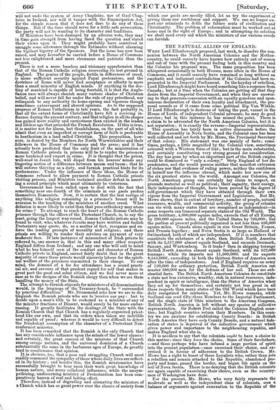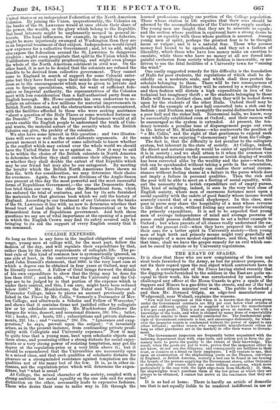THE NATURAL ALLIES OF ENGLAND.
WHEN Lord Ellenborough proposed, last week, to dissolve the con- nexion between the North American Colonies and the Mother. country, he could scarcely have known how entirely out of season and out of tune with the present feeling both in this country and the Colonies his proposal was. The same proposition has been whispered occasionally in both Houses, more often in the House of Commons, and it could scarcely have remained so long without an emphatic and indignant contradiction if the Colonies had been re- presented in the Imperial Parliament. In the heyday of rebellion, Lord Ellenborough might have heard something like a response from Canada ; but at a time when the Colonies are getting all that they desire from the Imperial Government, and when they are answer- ing to that generous concession with an equally generous and spon- taneous declaration of their own loyalty and attachment, the pro- posal sounds as if it came from some political Rip Tan Winkle. If Lord Ellenborough is desirous of taking the post, vacant in the House of Lords, of independent Colonial advocate, he may do good service ; but in this instance he has missed the point. There is a claim to be advocated for the North American Colonies, but it is not separation ; it is exactly the reverse—Imperial representation. This question has lately been in active discussion before the House of Assembly in Nova Scotia, and the Colonial case has been well collected and set forth by Mr. Howe, the Provincial Secretary of that colony. His statement was one mainly of facts ; some- times, perhaps, a little magnified by the Colonial view, sometimes coloured with a Western force of tint ; but in the main substantial, and certainly constituting very strong ground for consideration. The day has gone by when an important part of the British empire could be dismissed as "only a colony." Strip England of her de- pendencies, and she would possess neither that manifest extension of riches nor that evidence of ruling power, neither the confidence in herself nor the influence abroad, which make her now one of the six greatest states in the world. Amongst our Colonies, the North American group can certainly lay claim to respect, on grounds material as well as political; their sagacity, their energy, their independence of thought, have been proved by the degree of self-government which they have obtained through their own vigour from the Imperial Government and Legislature. But Mr. Howe shows, that in extent of territory, number of people, natural resources, wealth, and commercial activity., the group of colonies can vie with many states that are recognized as independent—in some respects can transcend separate states of the Old World. The gross territory, 4,000,000 square miles, exceeds that of all Europe, by 290,000 square miles, and the 'United States by 769,000; but the portion at present politically organized is not less than 486,000 square miles. Canada alone equals in size Great Britain, France, and Prussia together ; and Nova Scotia is as large as Holland or Switzerland, both of which are independent. If it is numbers that constitute the substance of a state then British North America with its 2,517,000 almost equals Scotland, and exceeds Denmark, Saxony, and Wiirtemberg. Is it trade ? then in shipping tonnage British North America almost equals Scotland, with its 522,000 tonnage ; while its imports are 11,500,000/. and its exports 9,545,0001., exceeding in both the thirteen States of America soon after the time of independence. And if England requires an army of 120,000 for ordinary protection, British North America can muster 380,000 men for the defence of her soil. These are sub- stantial facts. The British North American Colonies do constitute a state not less extensive, wealthy, rich in natural resources, inde- pendent in spirit or intelligence, than the States of America when they set up for themselves ; and certainly not less great in all these respects than many states of the Old World which have been duly recognized for centuries. Yet, Mr. Howe remarks, while Scotland can send fifty-three Members to the Imperial Parliament, and the single state of Ohio nineteen to the American Congress, British North America is left without any species of collective representation. Sir Robert Peel called the Colonies English coun- ties; but English counties return their Members. In this coun- try we are anxious for establishing County Boards : in British North America they have only County Boards, and a natural fede- ration of states is deprived of the collective government which gives power and importance to the neighbouring republic, and makes England what she is. It is needless to say that the colonists ought to have a choice in this matter; since they have the choice. Some of their forefathers, —and those perhaps who have infused a large portion of spirit into the present population—once exercised their choice, and ex- ercised it in favour of adherence to the British Crown. Mr. Howe has a right to boast of those Loyalists who, rather than join a rebellion and remain attached to the Republic, abandoned pro- perty and home passed the border, and began life again on the soil of Nova Scotia. There is no denying that the British colonists are again capable of exercising their choice, even as the country- men of Washington have done. For the present, Mr. Howe, who very fairly represents the moderate as well as the independent class of colonists, sees a balance of arguments against annexation to the Republic of the United States or an independent Federation of the North American Colonies. By joining the Union, unquestionably, the Colonies on the banks of the St. Lawrence would at once obtain their share of the power, the wealth, or the glory which belong to the Republic. But local interests might be unpleasantly merged in general in- terests. The local influences, for example, in regard to fisheries, might be more injuriously swamped at Washington than they are in an Imperial treatment of that subject. Independence would entail new expenses for a collective Government ; and, let us add, might also expose the federation around the St. Lawrence to dangerous rivalries • might even precipitate that split mule Union which the Nullificators are continually prophesying, and might even plunge the whole of the North American continent in civil war. On the other hand, it is not to be denied that the colonists are refused the benefits to be derived from collective government. They cannot come to England in search of support for some Colonial enter- prise but they have forced upon their minds the mortifying compa- rison as to the encouragement which may be given to private and even to foreign speculations, while, for want of sufficient fede- rative or Imperial authority, the representatives of the Colonies meet with less consideration than a half-authorized party from an English borough. Mr. Howe contrasts his own endeavour to ne- gotiate an advance of a few millions for material improvements in British North America, and the obstructions which he encountered, with the facilities afforded to those who were seeking assistance "about a question of the Holy Places or some wretched fortress on the Danube." Ten men in the Imperial Parliament would at all events enable the English people to understand the truth of Colo- nial wants, the material nature of the security which the British Colonies can give, the probity of the colonists. We also have some interest in this question ; and two illustra- tions will serve as well as the most elaborate arguments. At the present moment it is a matter of some solicitude to know whether in the conflict which may extend over the whole world we should have the United States for us or against us. Now it may be said to be within the choice of the British colonists in North America to determine whether they shall continue their allegiance to us, or whether they shall double the extent of that Republic which may be our friend but may also be our antagonist. By meeting the loyalty which the British North Americans have shown us thus far, with due consideration, we may determine their choice for evermore. Again, the two great divisions of the Anglo-Saxon race present at this day the most powerful and the most successful forms of Republican Government,—the one the Democratic form, less tried than our own; • the other the Monarchical form which has endured the trial of centuries, and has by its acts furnished the materials for that glorious book which we call the history of England. According to our treatment of our Colonies on the banks of the St. Lawrence it lies with us now to determine whether that broad tract of land shall be added to the Democratical or to the Monarchical form of Republican government. And both these questions we say are of vital importance at the opening of a period in which the English Crown may find its safety secured only by bringing to its aid the support of every English county that it can command.



































 Previous page
Previous page